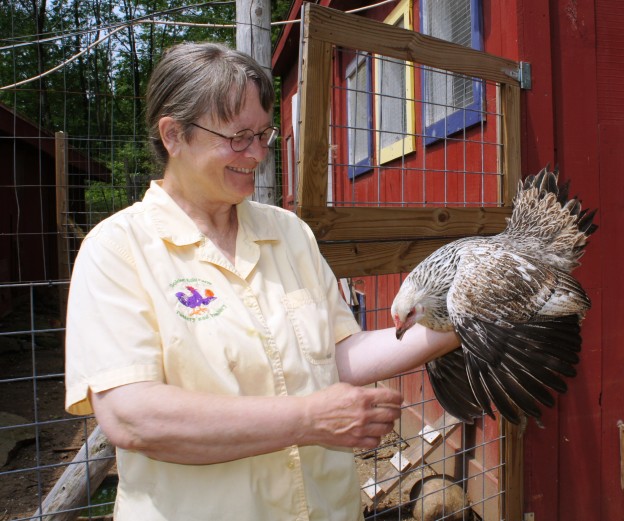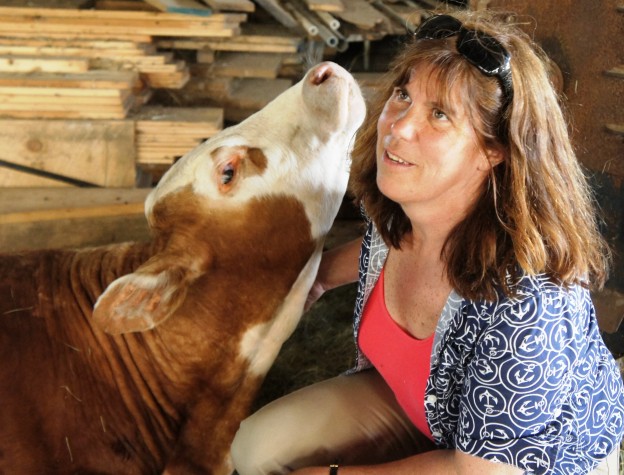
Kate Morreale of Golden Egg Farm (photo: Robin Cohen)
Robin Cohen of Doves and Figs treats us to her second installment in a series of essays on the farming community of Hardwick, MA. Through Robin’s eyes we visit Golden Egg and Chestnut Farms and meet the women farmers whose passion for animal husbandry imbues their lives and work.
Robin Cohen, Guest Contributor
Doves and Figs
On a cloudy morning a few weeks ago I drove out to Hardwick with my friend Patsy Kraemer, Manager of the Arlington Farmers Market. We took a rambling, slower route to Hardwick, passing abandoned mill buildings, tiny gas stations, the Whistle Stop cafe and the stately Gilbertville library.
Just outside of the small town center, we steered down the shaded, narrow road that leads to Golden Egg Farm. Kate Morreale, an artist and farmer, has decorated her farm with bright sunrise colors, and everywhere you turn you see chickens. Of course, there are the egg-laying feather-flocked type running about, but there are also metal hen sculptures, ceramic chickens, wire roosters (one gets the idea within minutes of arriving at the farm that Kate is a bit obsessed with chickens).
Kate’s love for these birds started somewhat by chance. One day soon after graduating from college, she walked into a farmers market and walked out with a dozen chicks. Was she planning on leaving her budding art career behind and becoming a farmer? “No” she told me “the chicks were just so fuzzy and cute and I got a puppy that day, too, so…well…you get the idea.”
When Kate and her husband took off to see the country in a VW Bus (this was the late 60s), the chickens and the puppy went with them. After crossing the country several times, they settled in Massachusetts, and Kate began raising chickens in earnest and selling the eggs to neighbors from her wildly painted van. Today, Kate runs the farm by herself, carefully raising her chickens to get the healthiest, beautiful and most productive birds, and selling the eggs at the farmers market. She has won many awards in poultry shows for her work.
In addition to tending chickens and growing vegetables, Kate is a potter. She creates vibrant tiles (yes, some with chicken designs) and custom ceramic plates that are given as awards at fairs, poultry shows and other contests. Kate also spins and dyes wool from local sheep. Her yarn work is her focus during the more quiet months on the farm come winter.
Over a cool glass of iced tea in Kate’s farmhouse kitchen, we talked about relationships between farmers in a small community such as Hardwick, and how just everyone in town grows or raises some of their own food. Often people barter one farm product for another, or in exchange for labor or materials. Kate explained that it was worth it for her to drive out to city markets with her eggs where they would fetch a better price and would be better appreciated than in a place where everyone has a least a few chickens.
Patsy and I finished our tea and left the whimsical land of chickens at Golden Egg Farm to visit Chestnut Farm. Farmer Kim Denney is also a first generation farmer who credits her childhood love of Little House on the Prairie books with influencing her to buy an abandoned farm and reclaim it for agriculture. It was a daunting job; early on Kim and her daughter Caroline alone removed 700 junked tires from the property in one season. The farm is so beautiful now it is hard to imagine the level of disrepair and neglect it had suffered.
When you meet Kim, you understand right away what has helped made her dream a reality. She exudes a frenetic energy, flitting in moments from worry over a litter of pigs being born, to getting a stuck truck out of the mud. In Kim I saw an interesting mix of multitasking executive and a child thrilled about the animals she’s compelled to share.
After a lovely tour of the farm with cows in the field, baby pigs in the barn and chickens who live in a re-purposed school bus, Kim insisted we climb a rocky path to the top of a hill to see her pigs. I muttered something about the hot day and its growing late but Kim was already headed on, saying brightly “it will be worth it.” She was right, of course. The pigs live in a lush forest — the fence at the edge and some drinking fountains all that remind you that this is not a wild land run by hogs.
As we stood and watched the animals romp together in dappled sunlight or nap in the shade, Patsy Kraemer and I talked about how much this kind of care in raising animals matter to both of us as cooks, and also to her as a responsible farmers market manager. The meat Chestnut Farms brings to the markets and distributes in their meat CSA is chemical- and hormone-free, and Kim is dedicated to raising healthy animals in an environmentally-positive way.
Kim’s husband, Rich Jakshtis — a Hardwick native, trained electrical engineer and talented builder — shares her dream of continuing to grow the farm and one day building a comprehensive education center to teach and exchange ideas with others about caring for animals and the land. For now, they open their farm and barns for one day each spring so CSA members and customers can visit. We ended our own tour hungry for lunch, and Kim insisted we try Rose32, a new bakery café in town. It was not at all what we expected and I will share more about that visit later in this series.
The farms we saw on this particular day were quite different, but there was a common thread shared by the two women farmers who fiercely love their animals. Watching Kim stop to scratch the bristly back of a hog or get a surprise kiss from a cow, and seeing Kate fluffing and cooing at one of her birds like a photographer flirting with a super model, I could see the joy these women take from and bring to their farm life.


Pingback: Part 3: The Farms of Hardwick, MA | Public Radio Kitchen
Love this series. I now live in Maine where natural and organic products are readily available near my town in in the coop. More people should get the idea of this kind of farming.